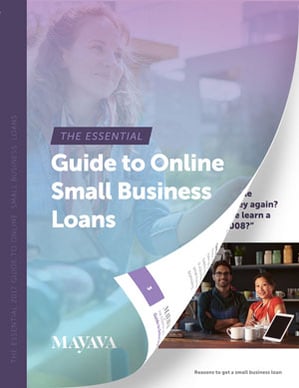Guide to Online Small Business Loans
Key Components Lenders Look For in Borrowers
The most important consideration to a lender is the same thing that has always mattered, whether it’s a bank, an alternative lender or a family member. Can you pay back the loan? Several factors go into determining whether a business can sustain new loan payments.

Time in business
Lenders, whether traditional banks, peer-to-peer, direct lenders or MCA companies, want to know that you’re established. Startup companies will always have the hardest time securing funding. Even if an applicant has a perfect credit score, he or she will find it hard to get financing for a new enterprise. But if you are seeking funds via a platform like Kickstarter, you may have more flexibility. In general, most lenders want to know that you have been in business for at least a year.
Credit
If you have existing debt, you might actually be in better shape than if your balance sheet is clean. Sounds counterintuitive, but it makes sense. Debt is important. Strike that. Debt that is consistently paid in a timely fashion is important. Lenders want to know that you are a responsible business owner, so demonstrating a solid personal and business credit report is essential. If you have had difficulty maintaining these obligations in the past but have been current for the past one to two years, there’s no need to worry. Behind every lending institution are people who understand that we just came out of the greatest financial crisis in two generations.
Industry
Put simply, there are some industries that lenders like more than others. Below are a few industries that lenders typically look favorably upon and a few that might be more challenged in their eyes.
TOP INDUSTRIES
|
CHALLENGING INDUSTRIES
|
But don’t worry if your business is on the challenging list, because an increasing number of specialty lenders are filling the void. This is a general guideline:
Revenue
Most alternative lenders want to see a minimum of $100,000 in annual sales. It goes without saying that the higher the sales, the greater the loan potential. Loans will always be capped at a percentage of sales because it demonstrates your company’s ability to pay the lender back. Some lenders will require financial statements or a year-end tax return. Mayava recommends supplying both in advance. It makes it easier to communicate any issues and/or demonstrate your ability to pay. No lender, unfortunately, is interested in your forward business plan. Regardless of how much you think you can make in the future, your business will be judged by what it has done in the immediate past. The great thing about the alternative lending market is that the distant past means a lot less time in this space than it does to traditional banks that customarily require multiple years of financial statements. Alternative lenders typically give more benefit of the doubt in terms of your past struggles.
Average Bank Balance
Do you frequently have negative balances? If so, this will be a consideration. Then again, it could be your primary reason for seeking a loan. Many businesses have operated on what is typically referred to as a “float.” This is when your traditional bank will allow your business to maintain a negative balance for a short time. It’s routinely accompanied by extremely high fees, so if your business falls into this category and you’re looking to eliminate these fees and establish a better credit rating for your business, make sure you let prospective lenders know. The most important thing regarding bank balances is to maintain positive balances at the end of every month. It shows that you have awareness of your situation and the ability to collect revenue on a consistent basis, even if you’re sometimes negative in between.
Number of Deposits
Here’s an example: Two businesses have $1,200,000 in annual sales. One has 20 accounts that pay $5,000 per month, and the other has two accounts that pay $50,000 per month. Both businesses look the same from the outside, but the lender will view the latter as a greater risk and likely decline the loan. When put in these terms, it should seem obvious. If Company A loses one client, it hardly impacts the top line. If Company B loses one client, it loses half of its revenue. Advantage: Company A—by a long shot.
Owner Credit Score
This factor is important, but not as significant as some might think. The owner credit score is typically the final check when lenders consider a loan. If a business owner has a great business but a credit score of 500 or less, most lenders will likely walk away. But many business owners have destroyed their personal credit to keep their businesses alive so it’s always worth a shot, particularly if the worst stuff is far in the rear-view mirror.
Quick App
Guide to Online Small Business Loans
CHAPTER 1
Reasons to Get a Small Business Loan
CHAPTER 2
Key Components Lenders Look For in Borrowers
CHAPTER 3
Unsecured – The Risk of Using Personal Assets
CHAPTER 4
Benefits of Using a Small Business Loan Broker
CHAPTER 5
How to Avoid Hidden Fees
CHAPTER 6
How to Avoid a Lending Scam
CHAPTER 7
Can I Get a Loan if I Have Outstanding Liens?
CHAPTER 8
Minimizing Tax Consequences
CHAPTER 9
2025 Online Lending Outlook (Hint: It’s a Borrower’s Market)
GLOSSARY
Glossary of Lending Terms and Acronyms
Next











